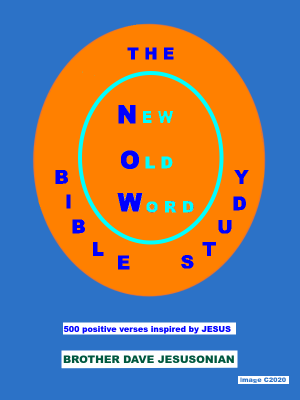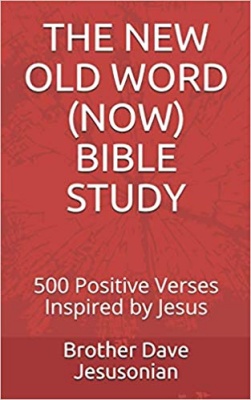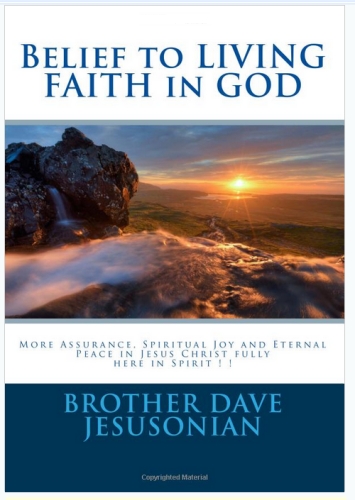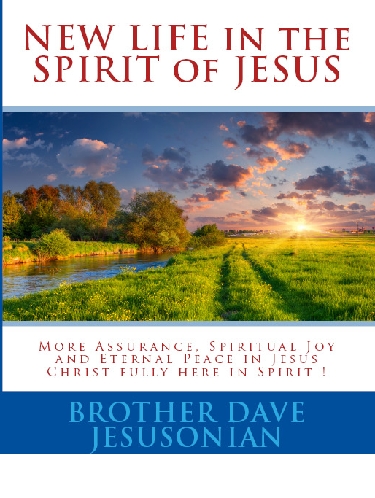|
TOPICAL STUDIES from
THE NEW EPOCHAL REVELATION OF TRUTH.
NOW UPDATED TOPICAL STUDIES INDEX Check these out:
"TRUTH and TRUTHS" -all, plus "GOD within you !"
Part 80
PAPER 167 THE VISIT TO PHILADELPHIA, Cont. 6. BLESSING THE LITTLE CHILDREN [Paper:Section.Paragraph (numbers)] 167:6.1 That evening Jesus' message regarding marriage and the blessedness of children spread all over Jericho, so that the next morning, long before Jesus and the apostles prepared to leave, even before breakfast time, scores of mothers came to where Jesus lodged, bringing their children in their arms and leading them by their hands, and desired that he bless the little ones. When the apostles went out to view this assemblage of mothers with their children, they endeavored to send them away, but these women refused to depart until the Master laid his hands on their children and blessed them. And when the apostles loudly rebuked these mothers, Jesus, hearing the tumult, came out and indignantly reproved them, saying: "Suffer little children to come to me; forbid them not, for of such is the kingdom of heaven. Verily, verily, I say to you, whosoever receives not the kingdom of God as a little child shall hardly enter therein to grow up to the full stature of spiritual manhood." 167:6.2 And when the Master had spoken to his apostles, he received all of the children, laying his hands on them, while he spoke words of courage and hope to their mothers. 167:6.3 Jesus often talked to his apostles about the celestial mansions and taught that the advancing children of God must there grow up spiritually as children grow up physically on this world. And so does the sacred oftentimes appear to be the common, as on this day these children and their mothers little realized that the onlooking intelligences of Nebadon beheld the children of Jericho playing with the Creator of a universe. [And our Universe Creator Jesus Christ Michael loves all humans and beings, even little children ! God is no respecter of persons ! Later here, we will read about "the infinite worth of the finite." (We humans !!!)] 167:6.4 Woman's status in Palestine was much improved by Jesus' teaching; and so it would have been throughout the world if his followers had not departed so far from that which he painstakingly taught them. [This great revelation will greatly improve world conditions on many levels.] 167:6.5 It was also at Jericho, in connection with the discussion of the early religious training of children in habits of divine worship, that Jesus impressed upon his apostles the great value of beauty as an influence leading to the urge to worship, especially with children. The Master by precept and example taught the value of worshiping the Creator in the midst of the natural surroundings of creation. He preferred to commune with the heavenly Father amidst the trees and among the lowly creatures of the natural world. He rejoiced to contemplate the Father through the inspiring spectacle of the starry realms of the Creator Sons. 167:6.6 When it is not possible to worship God in the tabernacles of nature, men should do their best to provide houses of beauty, sanctuaries of appealing simplicity and artistic embellishment, so that the highest of human emotions may be aroused in association with the intellectual approach to spiritual communion with God. Truth, beauty, and holiness are powerful and effective aids to true worship. But spirit communion is not promoted by mere massive ornateness and overmuch embellishment with man's elaborate and ostentatious art. Beauty is most religious when it is most simple and naturelike. How unfortunate that little children should have their first introduction to concepts of public worship in cold and barren rooms so devoid of the beauty appeal and so empty of all suggestion of good cheer and inspiring holiness ! The child should be introduced to worship in nature's outdoors and later accompany his parents to public houses of religious assembly which are at least as materially attractive and artistically beautiful as the home in which he is daily domiciled. 7. THE TALK ABOUT ANGELS 167:7.1 As they journeyed up the hills from Jericho to Bethany, Nathaniel walked most of the way by the side of Jesus, and their discussion of children in relation to the kingdom of heaven led indirectly to the consideration of the ministry of angels. Nathaniel finally asked the Master this question: "Seeing that the high priest is a Sadducee, and since the Sadducees do not believe in angels, what shall we teach the people regarding the heavenly ministers?" Then, among other things, Jesus said: 167:7.2 "The angelic hosts are a separate order of created beings; they are entirely different from the material order of mortal creatures, and they function as a distinct group of universe intelligences. Angels are not of that group of creatures called 'the Sons of God' in the Scriptures; [They are the Daughters of God, created by the Infinite Spirit or the Holy Spirit here acting for/as the Infinite Spirit.] neither are they the glorified spirits of mortal men who have gone on to progress through the mansions on high. Angels are a direct creation, and they do not reproduce themselves. The angelic hosts have only a spiritual kinship with the human race. As man progresses in the journey to the Father in Paradise, he does traverse a state of being at one time analogous to the state of the angels, but mortal man never becomes an angel. 167:7.3 "The angels never die, as man does. The angels are immortal unless, perchance, they become involved in sin as did some of them with the deceptions of Lucifer. [and also Satan and Caligastia under Lucifer] The angels are the spirit servants in heaven, and they are neither all-wise nor all-powerful. But all of the loyal angels are truly pure and holy. 167:7.4 "And do you not remember that I said to you once before that, if you had your spiritual eyes anointed, you would then see the heavens opened and behold the angels of God ascending and descending? It is by the ministry of the angels that one world may be kept in touch with other worlds, for have I not repeatedly told you that I have other sheep not of this fold? And these angels are not the spies of the spirit world who watch upon you and then go forth to tell the Father the thoughts of your heart and to report on the deeds of the flesh. The Father has no need of such service inasmuch as his own spirit lives within you. [Very True !] But these angelic spirits do function to keep one part of the heavenly creation informed concerning the doings of other and remote parts of the universe. And many of the angels, while functioning in the government of the Father and the universes of the Sons, are assigned to the service of the human races. When I taught you that many of these seraphim are ministering spirits, I spoke not in figurative language nor in poetic strains. And all this is true, regardless of your difficulty in comprehending such matters. 167:7.5 "Many of these angels are engaged in the work of saving men, for have I not told you of the seraphic joy when one soul elects to forsake sin and begin the search for God? I did even tell you of the joy in the presence of the angels of heaven over one sinner who repents, thereby indicating the existence of other and higher orders of celestial beings who are likewise concerned in the spiritual welfare and with the divine progress of mortal man. [The many levels of Angels, Heavenly Hosts and Ministering Spirits were covered here in depth. Use the word search near the top of this home page.] 167:7.6 "Also are these angels very much concerned with the means whereby man's spirit is released from the tabernacles of the flesh and his soul escorted to the mansions in heaven. Angels are the sure and heavenly guides of the soul of man during that uncharted and indefinite period of time which intervenes between the death of the flesh and the new life in the spirit abodes." [Wonderful ! We should try to understand and work with angels and midwayers here more; they are united in promoting true cosmic consciousness and the Sovereignty of our Good Master Jesus !] 167:7.7 And he would have spoken further with Nathaniel regarding the ministry of angels, but he was interrupted by the approach of Martha, who had been informed that the Master was drawing near to Bethany by friends who had observed him ascending the hills to the east. And she now hastened to greet him. PAPER 168 THE RESURRECTION OF LAZARUS 0. Introduction 168:0.1 It was shortly after noon when Martha started out to meet Jesus as he came over the brow of the hill near Bethany. Her brother, Lazarus, had been dead four days and had been laid away in their private tomb at the far end of the garden late on Sunday afternoon. The stone at the entrance of the tomb had been rolled in place on the morning of this day, Thursday. 168:0.2 When Martha and Mary sent word to Jesus concerning Lazarus' illness, they were confident the Master would do something about it. They knew that their brother was desperately sick, and though they hardly dared hope that Jesus would leave his work of teaching and preaching to come to their assistance, they had such confidence in his power to heal disease that they thought he would just speak the curative words, and Lazarus would immediately be made whole. And when Lazarus died a few hours after the messenger left Bethany for Philadelphia, they reasoned that it was because the Master did not learn of their brother's illness until it was too late, until he had already been dead for several hours. 168:0.3 But they, with all of their believing friends, were greatly puzzled by the message which the runner brought back Tuesday forenoon when he reached Bethany. The messenger insisted that he heard Jesus say, ". . . this sickness is really not to the death." Neither could they understand why he sent no word to them nor otherwise proffered assistance. 168:0.4 Many friends from near-by hamlets and others from Jerusalem came over to comfort the sorrow-stricken sisters. Lazarus and his sisters were the children of a well-to-do and honorable Jew, one who had been the leading resident of the little village of Bethany. And notwithstanding that all three had long been ardent followers of Jesus, they were highly respected by all who knew them. They had inherited extensive vineyards and olive orchards in this vicinity, and that they were wealthy was further attested by the fact that they could afford a private burial tomb on their own premises. Both of their parents had already been laid away in this tomb. 168:0.5 Mary had given up the thought of Jesus' coming and was abandoned to her grief, but Martha clung to the hope that Jesus would come, even up to the time on that very morning when they rolled the stone in front of the tomb and sealed the entrance. Even then she instructed a neighbor lad to keep watch down the Jericho road from the brow of the hill to the east of Bethany; and it was this lad who brought tidings to Martha that Jesus and his friends were approaching. 168:0.6 When Martha met Jesus, she fell at his feet, exclaiming, "Master, if you had been here, my brother would not have died!" Many fears were passing through Martha's mind, but she gave expression to no doubt, nor did she venture to criticize or question the Master's conduct as related to Lazarus's death. When she had spoken, Jesus reached down and, lifting her upon her feet, said, "Only have faith, Martha, and your brother shall rise again." Then answered Martha: "I know that he will rise again in the resurrection of the last day; and even now I believe that whatever you shall ask of God, our Father will give you." 168:0.7 Then said Jesus, looking straight into the eyes of Martha: "I am the resurrection and the life; he who believes in me, though he dies, yet shall he live. In truth, whosoever lives and believes in me shall never really die. Martha, do you believe this?" And Martha answered the Master: "Yes, I have long believed that you are the Deliverer, the Son of the living God, even he who should come to this world." [When we humans die, we lose all consciousness of time lapse. Thus if we are physically dead just three days or a thousand or more years, we experience being awake as if at the exact instant of death ! This is also called "striking step with eternity" ! Jesus Christ is all-powerful to really seek and really save all the lost humans ! "I will draw ALL humans onto Me !" [See John 12:32] 168:0.8 Jesus having inquired for Mary, Martha went at once into the house and, whispering to her sister, said, "The Master is here and has asked for you." And when Mary heard this, she rose up quickly and hastened out to meet Jesus, who still tarried at the place, some distance from the house, where Martha had first met him. The friends who were with Mary, seeking to comfort her, when they saw that she rose up quickly and went out, followed her, supposing that she was going to the tomb to weep. 168:0.9 Many of those present were Jesus' bitter enemies. That is why Martha had come out to meet him alone, and also why she went in secretly to inform Mary that he had asked for her. Martha, while craving to see Jesus, desired to avoid any possible unpleasantness which might be caused by his coming suddenly into the midst of a large group of his Jerusalem enemies. It had been Martha's intention to remain in the house with their friends while Mary went to greet Jesus, but in this she failed, for they all followed Mary and so found themselves unexpectedly in the presence of the Master. 168:0.10 Martha led Mary to Jesus, and when she saw him, she fell at his feet, exclaiming, "If you had only been here, my brother would not have died!" And when Jesus saw how they all grieved over the death of Lazarus, his soul was moved with compassion. 168:0.11 When the mourners saw that Mary had gone to greet Jesus, they withdrew for a short distance while both Martha and Mary talked with the Master and received further words of comfort and exhortation to maintain strong faith in the Father and complete resignation to the divine will. 168:0.12 The human mind of Jesus was mightily moved by the contention between his love for Lazarus and the bereaved sisters and his disdain and contempt for the outward show of affection manifested by some of these unbelieving and murderously intentioned Jews. Jesus indignantly resented the show of forced and outward mourning for Lazarus by some of these professed friends inasmuch as such false sorrow was associated in their hearts with so much bitter enmity toward himself. Some of these Jews, however, were sincere in their mourning, for they were real friends of the family. 1. AT THE TOMB OF LAZARUS 168:1.1 After Jesus had spent a few moments in comforting Martha and Mary, apart from the mourners, he asked them, "Where have you laid him?" Then Martha said, "Come and see." And as the Master followed on in silence with the two sorrowing sisters, he wept. When the friendly Jews who followed after them saw his tears, one of them said: "Behold how he loved him. Could not he who opened the eyes of the blind have kept this man from dying?" By this time they were standing before the family tomb, a small natural cave, or declivity, in the ledge of rock which rose up some thirty feet at the far end of the garden plot. 168:1.2 (1844.1) It is difficult to explain to human minds just why Jesus wept. While we have access to the registration of the combined human emotions and divine thoughts, as of record in the mind of the Personalized Adjuster, we are not altogether certain about the real cause of these emotional manifestations. We are inclined to believe that Jesus wept because of a number of thoughts and feelings which were going through his mind at this time, such as: 168:1.3 1. He felt a genuine and sorrowful sympathy for Martha and Mary; he had a real and deep human affection for these sisters who had lost their brother. 168:1.4 2. He was perturbed in his mind by the presence of the crowd of mourners, some sincere and some merely pretenders. He always resented these outward exhibitions of mourning. He knew the sisters loved their brother and had faith in the survival of believers. These conflicting emotions may possibly explain why he groaned as they came near the tomb. 168:1.5 3. He truly hesitated about bringing Lazarus back to the mortal life. His sisters really needed him, but Jesus regretted having to summon his friend back to experience the bitter persecution which he well knew Lazarus would have to endure as a result of being the subject of the greatest of all demonstrations of the divine power of the Son of Man. [I believe this is the main reason.] 168:1.6 And now we may relate an interesting and instructive fact: Although this narrative unfolds as an apparently natural and normal event in human affairs, it has some very interesting side lights. While the messenger went to Jesus on Sunday, telling him of Lazarus's illness, and while Jesus sent word that it was "not to the death," at the same time he went in person up to Bethany and even asked the sisters, "Where have you laid him?" Even though all of this seems to indicate that the Master was proceeding after the manner of this life and in accordance with the limited knowledge of the human mind, nevertheless, the records of the universe reveal that Jesus' Personalized Adjuster issued orders for the indefinite detention of Lazarus's Thought Adjuster on the planet subsequent to Lazarus's death, and that this order was made of record just fifteen minutes before Lazarus breathed his last. 168:1.7 Did the divine mind of Jesus know, even before Lazarus died, that he would raise him from the dead? We do not know. We know only what we are herewith placing on record. 168:1.8 Many of Jesus' enemies were inclined to sneer at his manifestations of affection, and they said among themselves: "If he thought so much of this man, why did he tarry so long before coming to Bethany? If he is what they claim, why did he not save his dear friend? What is the good of healing strangers in Galilee if he cannot save those whom he loves?" And in many other ways they mocked and made light of the teachings and works of Jesus. 168:1.9 And so, on this Thursday afternoon at about half past two o'clock, was the stage all set in this little hamlet of Bethany for the enactment of the greatest of all works connected with the earth ministry of [Jesus Christ] Michael of Nebadon, [our local universe, having ten million human inhabited planets when completed in this Grand Universe Age; now it may be about 2/3 done.] the greatest manifestation of divine power during his incarnation in the flesh, since his own resurrection occurred after he had been liberated from the bonds of mortal habitation. 168:1.10 The small group assembled before Lazarus's tomb little realized the presence near at hand of a vast concourse of all orders of celestial beings assembled under the leadership of Gabriel and now in waiting, by direction of the Personalized Adjuster of Jesus, vibrating with expectancy and ready to execute the bidding of their beloved Sovereign. [!!] 168:1.11 When Jesus spoke those words of command, "Take away the stone," the assembled celestial hosts made ready to enact the drama of the resurrection of Lazarus in the likeness of his mortal flesh. Such a form of resurrection involves difficulties of execution which far transcend the usual technique of the resurrection of mortal creatures in morontia [soul] form and requires far more celestial personalities and a far greater organization of universe facilities. 168:1.12 When Martha and Mary heard this command of Jesus directing that the stone in front of the tomb be rolled away, they were filled with conflicting emotions. Mary hoped that Lazarus was to be raised from the dead, but Martha, while to some extent sharing her sister's faith, was more exercised by the fear that Lazarus would not be presentable, in his appearance, to Jesus, the apostles, and their friends. Said Martha: "Must we roll away the stone? My brother has now been dead four days, so that by this time decay of the body has begun." Martha also said this because she was not certain as to why the Master had requested that the stone be removed; she thought maybe Jesus wanted only to take one last look at Lazarus. She was not settled and constant in her attitude. As they hesitated to roll away the stone, Jesus said: "Did I not tell you at the first that this sickness was not to the death? Have I not come to fulfill my promise? And after I came to you, did I not say that, if you would only believe, you should see the glory of God? Wherefore do you doubt? How long before you will believe and obey?" 168:1.13 When Jesus had finished speaking, his apostles, with the assistance of willing neighbors, laid hold upon the stone and rolled it away from the entrance to the tomb. 168:1.14 It was the common belief of the Jews that the drop of gall on the point of the sword of the angel of death began to work by the end of the third day, so that it was taking full effect on the fourth day. They allowed that the soul of man might linger about the tomb until the end of the third day, seeking to reanimate the dead body; but they firmly believed that such a soul had gone on to the abode of departed spirits ere the fourth day had dawned. 168:1.15 These beliefs and opinions regarding the dead and the departure of the spirits of the dead served to make sure, in the minds of all who were now present at Lazarus's tomb and subsequently to all who might hear of what was about to occur, that this was really and truly a case of the raising of the dead by the personal working of one who declared he was "the resurrection and the life." 2. THE RESURRECTION OF LAZARUS 168:2.1 As this company of some forty-five mortals stood before the tomb, they could dimly see the form of Lazarus, wrapped in linen bandages, resting on the right lower niche of the burial cave. While these earth creatures stood there in almost breathless silence, a vast host of celestial beings had swung into their places preparatory to answering the signal for action when it should be given by Gabriel, their commander. 168:2.2 Jesus lifted up his eyes and said: "Father, I am thankful that you heard and granted my request. I know that you always hear me, but because of those who stand here with me, I thus speak with you, that they may believe that you have sent me into the world, and that they may know that you are working with me in that which we are about to do." And when he had prayed, he cried with a loud voice, "Lazarus, come forth!" 168:2.3 Though these human observers remained motionless, the vast celestial host was all astir in unified action in obedience to the Creator's word. In just twelve seconds of earth time the hitherto lifeless form of Lazarus began to move and presently sat up on the edge of the stone shelf whereon it had rested. His body was bound about with grave cloths, and his face was covered with a napkin. And as he stood up before them -- alive -- Jesus said, "Loose him and let him go." 168:2.4 All, save the apostles, with Martha and Mary, fled to the house They were pale with fright and overcome with astonishment. While some tarried, many hastened to their homes. 168:2.5 Lazarus greeted Jesus and the apostles and asked the meaning of the grave cloths and why he had awakened in the garden. Jesus and the apostles drew to one side while Martha told Lazarus of his death, burial, and resurrection. She had to explain to him that he had died on Sunday and was now brought back to life on Thursday, inasmuch as he had had no consciousness of time since falling asleep in death. [that is important; that the dead have no consciousness of time ! But our resurrection will be very much realized and valued in our newly formed, soul-level, super-body and super-mind!] 168:2.6 As Lazarus came out of the tomb, the Personalized Adjuster of Jesus, now chief of his kind in this local universe, [!!] gave command to the former Adjuster of Lazarus, now in waiting, to resume abode in the mind and soul of the resurrected man. 168:2.7 Then went Lazarus over to Jesus and, with his sisters, knelt at the Master's feet to give thanks and offer praise to God. Jesus, taking Lazarus by the hand, lifted him up, saying: "My son, [Yes, we are sons of Jesus our Creator Father-Son. We call ourselves Jesusonians.] what has happened to you will also be experienced by all who believe this gospel except that they shall be resurrected in a more glorious form. You shall be a living witness of the truth which I spoke -- I am the resurrection and the life. [Yes !!!] But let us all now go into the house and partake of nourishment for these physical bodies." 168:2.8 As they walked toward the house, Gabriel dismissed the extra groups of the assembled heavenly host while he made record of the first instance on Urantia, [Earth,] and the last, where a mortal creature had been resurrected in the likeness of the physical body of death. [True ! There is no "reincarnation" of any other human back here in physical form ! Some advanced humans can visit here in soul or spirit form for specialized functions; but they do not ever communicate back to any humans here in this present age ! Lazarus was and is the only exception to this !] 168:2.9 Lazarus could hardly comprehend what had occurred. He knew he had been very sick, but he could recall only that he had fallen asleep and been awakened. He was never able to tell anything about these four days in the tomb because he was wholly unconscious. Time is nonexistent to those who sleep the sleep of death. 168:2.10 Though many believed in Jesus as a result of this mighty work, others only hardened their hearts the more to reject him. By noon the next day this story had spread over all Jerusalem. Scores of men and women went to Bethany to look upon Lazarus and talk with him, and the alarmed and disconcerted Pharisees hastily called a meeting of the Sanhedrin that they might determine what should be done about these new developments. NOTE: The next part of this Topical Study, Part 81, will be posted here Monday, April 29, 2024 Spiritual High-Lights of Jesus Christ Spiritual High-Lights of the Fifth Epochal Revelation FIFTH EPOCHAL REVELATION (full text and my added comments)
|
|
| ||






